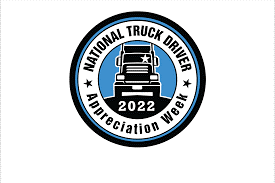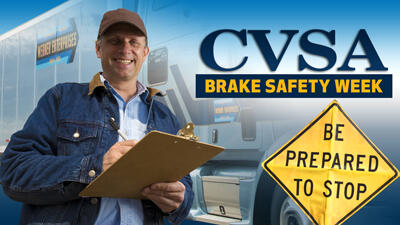July is UV Protection Month
Read the latest Idealease safety bulletin below or access the entire bulletin here. Remember to sign up for the weekly bulletin and receive it directly in your inbox! Stay informed on the latest safety news, tips, and information!
In This Issue:
- Protecting Yourself From the Sun
- Truck Driver Appreciation Week
- Driver Recognition Rewards
Protecting Yourself From the Sun
Sunglasses are not just a fashion accessory. They provide protection for your eyes against damaging UV rays. Wearing proper eye protection blocks the harmful rays. Below are tips for picking out the right pair of nonprescription sunglasses.
- Choose glasses that block 99 percent of ultraviolet (UV) rays. This is the most important feature of your sunglasses. Long-term exposure to ultraviolet (UV) radiation in sunlight is linked to eye disease, including cataracts. Some manufacturers' labels say UV absorption up to 400nm. This is the same thing as 100 percent UV absorption. Some glasses make additional claims for blocking infrared rays, but research has not shown a close connection between infrared rays and eye disease.
- Do not rely on the price. Many types of affordable sunglasses offer 99 to 100 percent UV protection, you do not need to spend a lot of money to find quality sunglasses.
- Check the quality of the sunglasses. In addition to UV protection, you also want to check the optical quality of the lenses. You can easily assess the quality of sunglasses by looking at something with a rectangular pattern, such as a floor tile. Hold the glasses at a comfortable distance and cover one eye. Move the glasses slowly from side to side, then up and down. If the lines stay straight, the lenses are fine. If the lines wiggle, especially in the center of the lens, try another pair.
- Look for impact-resistant lenses. All sunglasses must meet impact standards set by the U.S. Food and Drug Administration (FDA) for safety. No lens is truly unbreakable, but plastic lenses are less likely to shatter when hit by a ball or stone. Polycarbonate plastics, used in many sports sunglasses, are especially strong, but scratch easily. If you buy polycarbonate lenses, choose ones with a scratch-resistant coating.
- Use protective eyewear instead of sunglasses for hazardous activities. If you are going to be engaged in outdoor activities like water or snow skiing that put your eye at risk for injury, do not count on your eyeglasses for protection. Protective eyewear is available with UV protection to shield your eyes from sunburn and glare.
- Lens color tinting and polarization are personal preferences. There is no medical reason to recommend one tint of the lens over another. Likewise, while polarized lenses work better at deflecting glare, they are not blocking any more harmful UV light than non-polarized lenses.
- Once you have the right sunglasses, make sure you wear them. especially in the summer when UV levels are at least three times higher than in the winter. Also be sure to wear them when participating in winter sports, particularly at high elevations.
National Truck Driver Appreciation Week
Nearly every aspect of daily life is made possible because a truck driver delivered the goods and resources people need.
National Truck Driver Appreciation Week is a crucial time for America to pay respect and thank all the professional truck drivers for their hard work and commitment in undertaking one of our economy's most demanding and important jobs. These 3.5 million professional men and women not only deliver our goods safely, securely, and on time, but they also keep our highways safe.
This year's National Truck Driver Appreciation Week is September 11-17, 2022 and takes on a special significance considering the crucial role truck drivers played during the COVID-19 pandemic.
Americans and Canadians have taken extraordinary steps to show their appreciation for the important work that professional truck drivers have done as we navigate our way through the coronavirus pandemic. From children passing out lunches, to "I Heart Truck" signs across the highways, the public has taken notice of the essential role truck drivers play in their lives. As we reflect on the past three years, I often wonder where we would be today if the truck drivers had refused to drive the trucks that were delivering our personal protective equipment (PPE), food, medical supplies and the list goes on and on!
This week in September is a small way to show appreciation to the 3.5 million professional men and women who not only deliver our goods safely, securely, and on time, but also keep our highways safe. Start planning now to do something special for your drivers during this week in September that we set aside to recognize them.
Driver Recognition Rewards
Driver Appreciation week is a good time to review the award and recognition programs that you have in place. We must recognize those drivers who have performed in a safe and compliant manner. Recognition awards are best used for safe driving. A recognition award should be an award that the driver or employee cannot get anywhere else. It is best if these awards are personalized. The benefits of recognition awards are that they are non-monetary and have a longer-lasting effect. A driver should not be able to go and buy this award on their own. The only way to receive the award and recognition is to meet the requirements for receiving the award. These awards can be further enhanced by presenting award group presentations with peers (i.e. meetings, banquets, etc.).
As a motor carrier, there are several state and national association award programs that you can enroll your drivers in. I would recommend that you contact your state trucking association for a listing of the awards programs that are available. There are a variety of awards programs available for your drivers through organizations such as the American Trucking Association (www.truckline.com) and the National Private Truck Council (NPTC). The NPTC has the Driver Hall of Fame and National Driver All-Stars driver’s awards programs that are available to NPTC members. Go to: www.nptc.org to enroll your driver.

Driver Incentive Awards:
Incentive monetary awards are best used to motivate a driver to perform. These types of incentive programs are successful in motivating the driver to achieve a specific goal such a certain fuel mileage or a clean roadside inspection.
National Private Truck Council (NPTC) Signs Coalition Letter Supporting TSA Background Check Legislation
NPTC has signed on to a letter supporting the passage of the TSA Security Threat Assessment Application Modernization Act (H.R. 6571, S. 4298), which would eliminate duplication of background checks and fees for persons seeking a Transportation Worker Identification Credential (TWIC) and a Hazardous Materials Endorsement.
Under the current requirements, drivers who want a TWIC and an HME must undergo separate but identical security threat assessments (background checks) and pay separate fees for the two credentials. This legislation would require States to recognize the background check already in an applicant’s file and eliminate the duplicate fee.
The letter was sent to the leadership and general membership of the House Committee on Homeland Security and the Senate Committee on Commerce, Science, and Transportation. On July 13, the Senate Commerce Committee held a hearing to consider the nomination of David Pekoske to be Administrator of the Transportation Security Administration.
Brake Safety Week
August 21-27, 2022
Brake Safety Week is held annually to ensure commercial motor vehicle brake safety inspection, enforcement, and education initiative. Brake Safety Week is conducted by law enforcement jurisdictions in Canada, Mexico, and the U.S. Inspectors will conduct their usual North American Standard Level I and V Inspections and capture and report brake-related data to CVSA. The results will be released in the fall.
View last year’s Brake Safety Week results.

Question of the Week
I got a warning letter from the FMCSA regarding my CSA SMS scores…what do I do?
A warning letter is your chance to improve your safety performance and compliance without further intervention from the Federal Motor Carrier Safety Administration (FMCSA). Read the letter carefully because it identifies your company’s specific safety performance and compliance problems based on Safety Measurement System (SMS) data, explains how to access your safety record, and outlines the consequences if your company’s safety performance and compliance do not improve.
What happens next?
You do not need to respond directly to the letter. FMCSA will continue to monitor your safety performance and compliance through its SMS at http://ai.fmcsa.dot.gov/sms/. It is also important for you, as a motor carrier, to regularly check your SMS data. If your safety performance and compliance do not improve, FMCSA may conduct additional interventions that could result in fines and/or suspension or revocation of your company’s operating authority. These interventions may include Offsite or Onsite Investigations.
*The Idealease Safety Bulletin is provided for Idealease locations and their customers and is not to be construed as a complete or exhaustive source of compliance or safety information. The Idealease Safety Bulletin is advisory in nature and does not warrant, guarantee, or otherwise certify compliance with laws, regulations, requirements, or guidelines of any local, state, or Federal agency and/or governing body, or industry standards.
